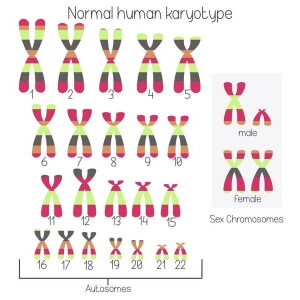One of the modern diagnostic methods is karyotyping. This study allows you to diagnose a number of chromosomal diseases and is prescribed to spouses for problems with conceiving and bearing a child, as well as to assess the risks of having a baby with genetic abnormalities and diseases. Iryna Roiko - doctor obstetrician-gynecologist of «Bogoliuby MC » will give you more details about the analysis on a karyotype.
What is a karyotype?
A karyotype is a chromosome set of a human, a kind of genetic passport that does not change throughout life.
Normally, a person’s karyotype has 46 chromosomes (23 chromosomes from each of the parents). The normal female karyotype is designated as 46, XX, and the normal male karyotype is 46, XY. In some cases, a person’s karyotype can have certain abnormalities - changes in the number of chromosomes or the structure of chromosomes. Such anomalies can be detected during cytogenetic studies (karyotype analysis).
Why does one make karyotype analyzes?
A healthy person may be a carrier of chromosomal abnormalities and not have signs of their presence. In such cases, chromosomal abnormalities, without external manifestations, can be the cause of infertility, miscarriage or the birth of children with developmental defects in married couples.
It should be noted that at the population level, the frequency of chromosomal abnormalities is low and amounts to 4-5 cases per 1000 people. However, this indicator increases significantly among couples with infertility (1-4%) or miscarriage (7-10%), and in groups of men with severe disorders, spermogenesis reaches 10-15%. It should be noted that at the population level, the frequency of chromosomal abnormalities is low and amounts to 4-5 cases per 1000 people. However, this indicator increases significantly among couples with infertility (1-4%) or miscarriage (7-10%), and in groups of men with severe disorders, spermogenesis reaches 10-15%.
What can be detected with karyotyping?
Karyotyping allows you to evaluate the condition of genes. The main genetic abnormalities include:
- Down's disease;
- Patau syndrome;
- Edwards syndrome;
- Klinefelter's syndrome;
- Shereshevsky-Turner syndrome;
- feline scream syndrome;
- polysomy on the X chromosome.
You can also detect a gene mutation of the Y chromosome (in this case, donor sperm ) must be used. The analysis also allows us to determine the mutation of the genes responsible for detoxification (low ability of the body to disinfect surrounding toxic factors), as well as the gene mutation in the cystic fibrosis gene (this helps to exclude the possibility of this disease in a child). In addition, karyotyping helps to diagnose a genetic predisposition to many diseases, for example, myocardial infarction, diabetes mellitus, hypertension, joint pathology and others.
Who is recommended to take a karyotype test?
Indications for the analysis are infertility (primary or secondary), habitual miscarriage, the birth of a child with multiple congenital malformations or stillbirths, male infertility factor (the presence of deviations in the spermogram), primary or secondary amenorrhea (lack of menstruation) or early menopause, age future parents over 35 years old, repeated and unsuccessful attempts at artificial insemination,contact with chemicals and radiation, the effects of harmful factors on women, especially in the recent past, (smoking, drinking alcohol, drugs, taking medications), the presence of spontaneous abortion (miscarriages, premature births, missed pregnancies) marriages between relatives, the presence of a child with chromosomal abnormalities or congenital malformations.
A study of the karyotype of a married couple is carried out both to identify asymptomatic carriage of chromosomal abnormalities, and to prevent the transmission of chromosomal abnormalities to descendants. The result of the karyotype analysis helps doctors determine the tactics of conducting a couple with infertility or habitual miscarriage, as well as assess the chances of spouses to have a healthy child and develop an individual program to solve the reproductive problems of married couples.
When are karyotype studies done?
The procedure for the study of karyotypes for spouses must be done at the stage of pregnancy planning. But the possibility of karyotyping is not excluded if the woman is already pregnant. Then karyotyping is carried out not only of the spouses, but also of the unborn child.
It should be noted that karyotyping is done only once in a lifetime, because the set of chromosomes and their characteristics cannot be changed with age.
The sense of karyotyping
To conduct a study of the karyotype of a married couple, it is necessary to donate venous blood. There is no special preparation for the analysis. The study of the karyotype is carried out for 21 days, the blood is cultured for 72 hours, special preparations are prepared that color the chromosomes, and they are analyzed using light microscopy. Conducting research on the karyotype of a married couple should be in specialized reproduction centers, where it is possible to conduct additional tests and get professional medical and genetic consultation.
What if the analysis showed deviations from the norm?
In the event of detection of gene mutations or chromosomal deficiencies in one of the spouses at the stage of pregnancy planning, the doctor explains to the couple the probability of having a sick child and the possible risks.
As you know, chromosomal and gene pathology is incurable, so the further decision rests on the shoulders of future parents (use donor sperm or an egg, risk taking a baby or being left without children).
If chromosomal abnormalities are detected during pregnancy, especially in the embryo, the woman is asked to interrupt it. However, doctors have no right to insist on abortion.
















